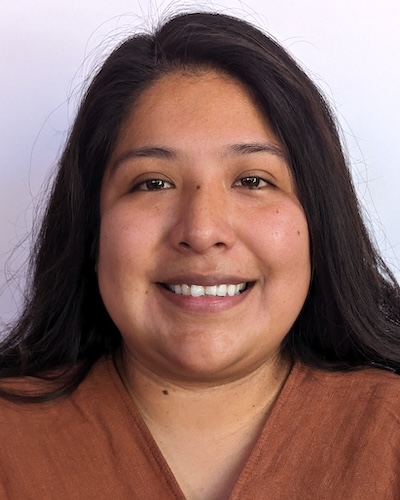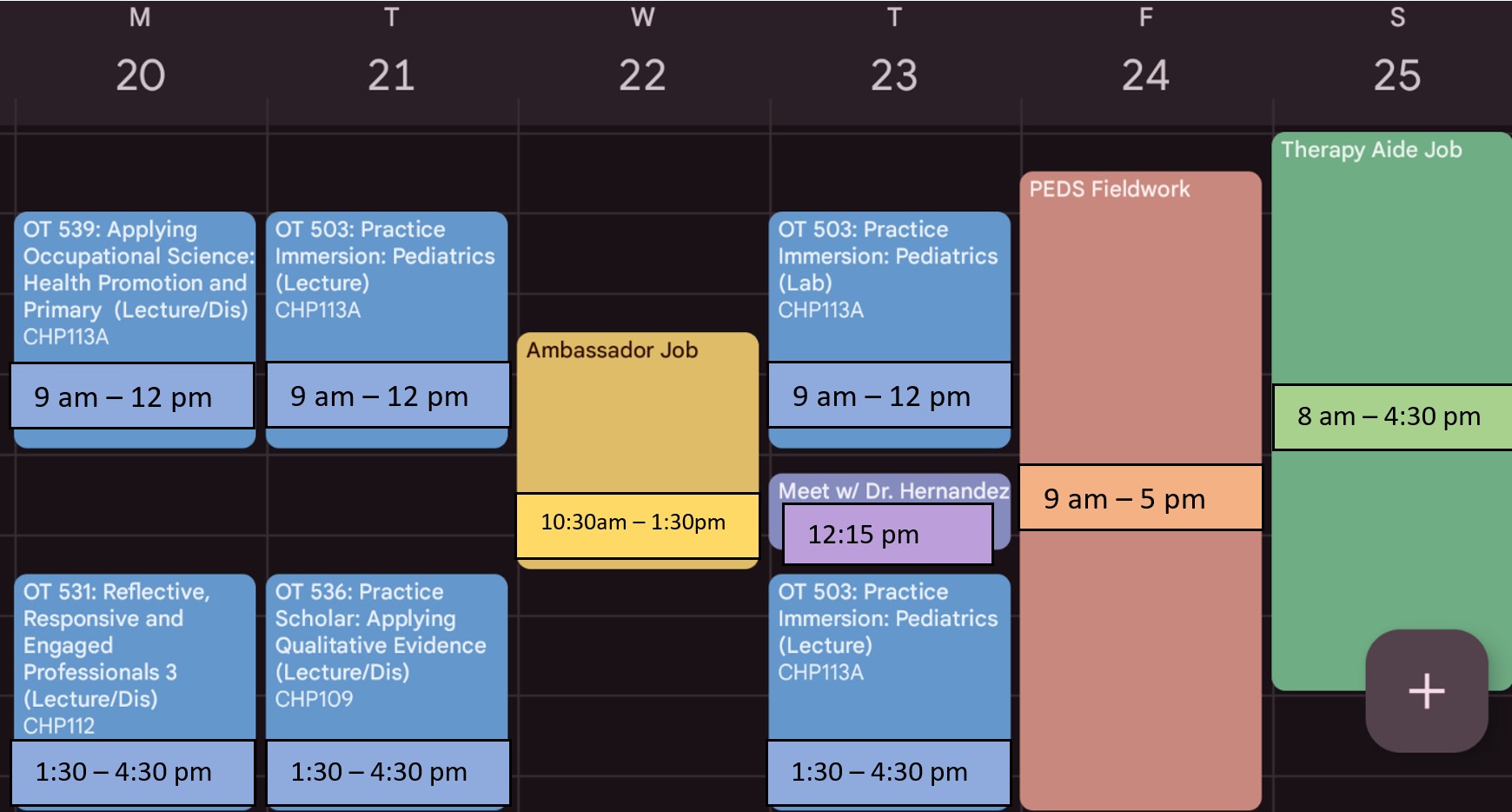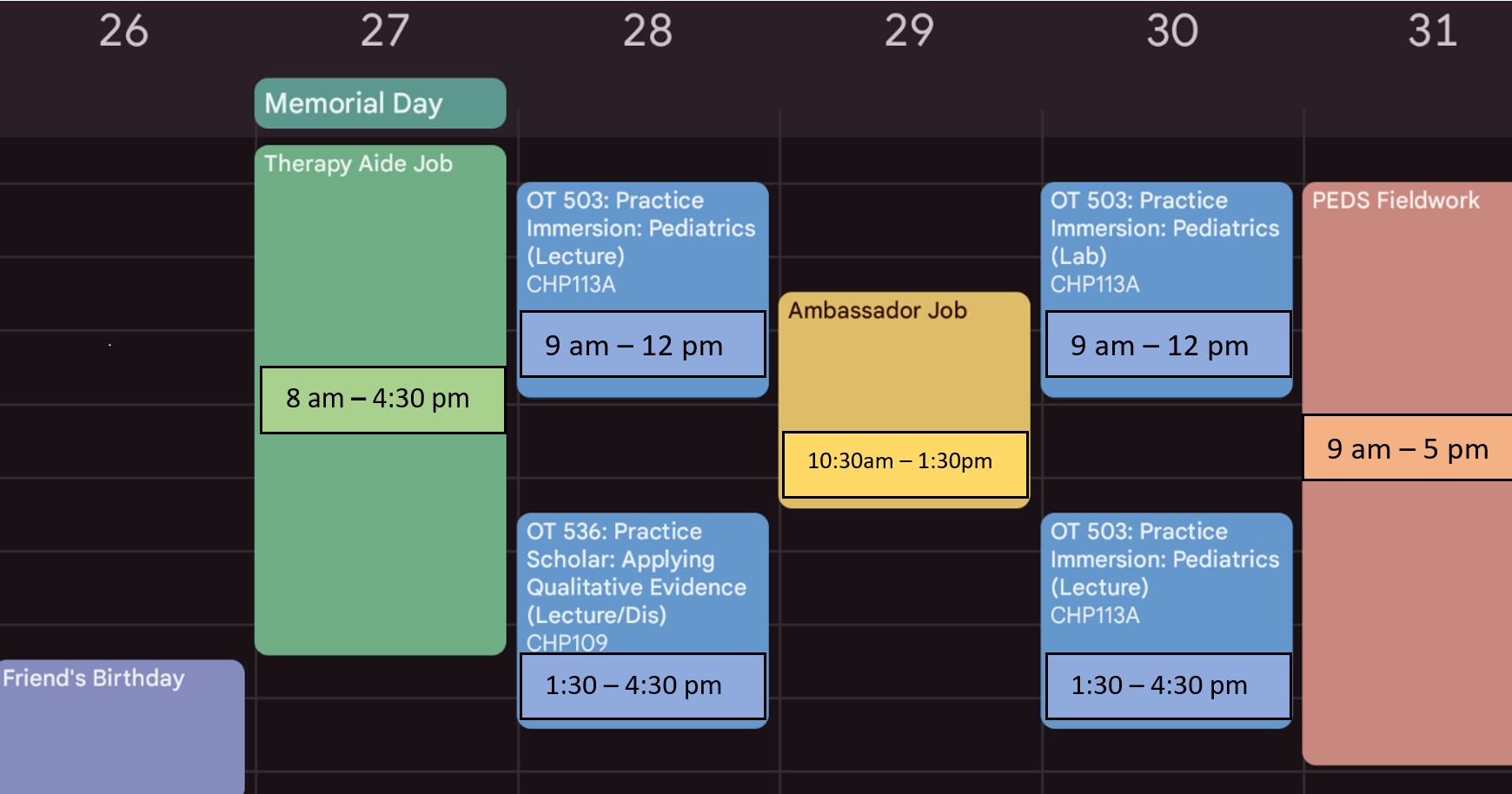Student Blog
Patricia

Shifting the Balance ⟩
August 22, 2024, by Patricia
Is it possible to work while being in grad school? Is there enough time to do my school work and study? Can I balance it all on top of trying to be an individual outside of all these roles? The answer to these questions is it depends on you and the reason I say that is because you are the best person who knows yourself. For me, being a full-time student, having two jobs, and living at home which if you know you know that living at home comes with additional roles (i.e., being a sister, a daughter, etc.) all while trying to remember that I’m still me is a lot. And balancing all these roles can be exhausting and throughout this semester-year I’ve learned how to set up my schedule to balance all I have going on. Here is a picture of my calendar in May, this was the start of the summer semester and looking back it was pretty packed.


My schedule is only a visual of what I have going on for the day, it doesn’t include the extra hidden items of what my days actually look like (e.g., studying, how I’m feeling, did I get enough sleep, etc.).
School
My school schedule is pretty consistent unless otherwise shared by the professors. What has been my biggest challenge is getting my school work and studying done because I do live at home. I stay on campus after classes are over either in the after hours support provided by the student support services or I find an available room at CHP. I’ve also stayed up late to get everything done which doesn’t sound as great, but it has worked for me. I also appreciate the early sign-ups on assignments, and or assignments that have a specific deadline, because I get to plan accordingly ahead of time. However, I will note that there have been unexpected moments (e.g., getting sick) that have side-tracked me. I’ve learned that communicating with your professors about what is going on in advance makes a difference. If you need help with the class material and/or assignments you should reach out earlier rather than later.
Work
My work schedule has been constantly changing since day one, but I have been very fortunate to have a job(s) that are flexible and accommodating to my student schedule. My job as a therapy aide is beyond amazing as I plan my work days carefully around the semester. My job as an ambassador is also flexible in understanding my role and priority as a student, if I’m not working in the office, I’m working remotely which is helpful to my schedule. I understand that not all workplaces are as flexible and accommodating. I do recommend you to guide your work days based on your class schedule, assignments, midterms, practicums, and finals. The first semester allows you to work more days but as you begin your spring semester, the immersion courses will add an additional day to your school schedule.
Life Outside of Work & School
I will admit I do take breaks in between it all and a huge thank you to my family and friends who constantly remind me to take care of myself. Sometimes I’ve gotten home from a long day and all I want to do is sleep and so I do. Take care of yourself, do what you need to do too, for instance engage in your favorite activities. Some of my favorite activities include playing video games, cooking, listening to music, sleeping, and spending time with my family members. I will engage in these activities before I start my school work or after, and it’s okay! Sometimes you just got to.
So after all that being said, is it possible to balance it all? I’m going to say, “yes.” I have done it this semester-year which is somehow unbelievable. But I also want to emphasize that you know yourself best! Balancing it all does have its challenges; it’s not perfect. I hope my sharing provides an insight to you all, as always I’m glad to answer any questions you may have. Fight On!
⋯

From Rejection to Redemption: My Second Attempt ⟩
August 15, 2024, by Patricia
Getting rejected the first time creates some type of feeling. For me it was sadness, questioning what went wrong, and thinking about what to do differently applying a second time around. Here are some of the areas I revisited and hope it helps you if you are applying a second time:
Meet with an Admissions Representative:
Set up an appointment to meet with an admissions representative, it truly makes a difference. Ask them questions about your application like, “what can I do to strengthen my application?” I had the opportunity to know what disqualified my application, and that was that one of my prerequisites was passed the seven years when I applied. If you have a question about your prerequisites or want to request a waiver you can do so by visiting this link: https://chan.usc.edu/education/entry-level-otd/admissions/prerequisite-inquiry.
Letters of Recommendation:
Asking for a letter of recommendation from people that don’t know about occupational therapy can be a little challenging. I composed and provided a brief written description of “What is occupational therapy (OT)?”, a list of attributes an occupational therapist has, and why I was interested in occupational therapy to the people I was asking for letters of recommendation from. This can help the individuals writing your letters of recommendation know and learn about OT and how your skills and work experience relate to OT. Also, give them a due date and do check-ins with them as the application window comes to an end.
Personal Statement and Other Prompts:
Writing the personal statement along with the other program prompts for me was an opportunity to reflect on why I was applying for OT. It was a time of vulnerability in sharing my story and I felt nervous when I asked them to read my statements. And with that said, I do recommend asking people that you feel comfortable with to read your personal statement. Also, if you need to redo your personal statement that’s okay. I redid my personal statement three times before I felt true and confident in my written statements and this wouldn’t have happened if I didn’t share them and receive feedback. Lastly, if you don’t know where or how to start writing, I would suggest writing down all your thoughts and experiences to give you a guide on what you want to talk/write about.
These are the three areas I focused the most on when applying a second time around to OT programs. Whether this is your first or second time applying, I hope these suggestions help. If you have any questions or would like to contact me, please reach out. I wish you the best in your application process and as always, Fight On!
⋯

Why did I decide to become a student ambassador? ⟩
May 30, 2024, by Patricia
I love working and communicating with prospective students, organizations, and schools that are interested in higher education. During my undergraduate studies at CSULA I had the opportunity to work as a student ambassador. I had the opportunity to work with high school students that resided in the east area of LA to apply and help them with their on-boarding process to CSULA, attend college fairs, support campus events, and more! I loved my role as an ambassador because I got to know and learn from everyone, but most importantly, develop relationships with students. As a Latina and first-generation student, I understood a lot of what students expressed and had concerns about. For example, ‘how to pay for college?’, ‘what do I want to major in?’, ‘what is graduate school?’, and the list goes on. Five years after receiving my B.A. those questions and unknowns were still applicable when I searched and applied to graduate school. I became a USC student ambassador to be an asset to you all. I am more than glad to help you in any way I can by sharing what I know, what I wish I knew before starting grad school, and more. If you are interested in learning more about Occupational Therapy, the USC Chan Division of Occupational Science and Occupational Therapy, or just simply wanting to chat, please reach out.
⋯





